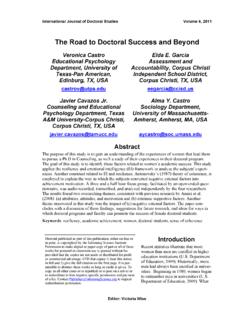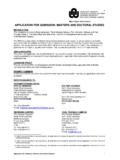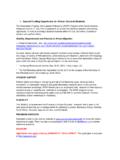Transcription of Higher Education Exchange - kettering.org
1 The Higher Education Exchange is founded on a thought articulated by Thomas Jefferson in 1820: I know no safe depository of the ultimate powers of the society but the people themselves; and if we think them not enlightened enough to exercise their control with a wholesome discretion, the remedy is not to take it from them, but to inform their discretion by the tradition of Jefferson, the Higher Education Exchange agrees that a central goal of Higher Education is to help make democracy possible by preparing citizens for public life. The Higher Education Exchange is part of a movement to strengthen Higher Education s democratic mission and foster a more democratic culture throughout American society. Working in this tradition, the Higher Education Exchange publishes case studies, analyses, news, and ideas about efforts within Higher Education to develop more democratic David W.
2 Brown Deborah WitteCopy Editor Joey Easton O DonnellArt Director/Production Long s Graphic Design, Design, Illustrations, and Formatting Long s Graphic Design, Inc. The Kettering Foundation is a nonprofit operating foundation, chartered in 1927, that does not make grants but welcomes partnerships with other institutions (or groups of institutions) and individuals who are actively working on problems of communities, governing, politics, and Education . The interpretations and conclusions contained in the Higher Education Exchange , unless expressly stated to the contrary, represent the views of the author or authors and not necessarily those of the foundation, its trustees, or officers. Copyright 2012 by the Kettering FoundationCONTENTSD eborah Witte Foreword 1 Harry Boyte Higher Education and the American 4 Commonwealth Partnership: An Interview Claire Snyder-Hall Tales From Anti-Civic U 13 Elizabeth Minnich Educating Democratically: An Interview 24 Mark Wilson and Living Democracy: A Project For Students 35 Nan Fairley and Citizens Ellen M.
3 Knutson and Civic Engagement and doctoral Education 48 Dan A. LewisRobin Hoecker Public Scholarship at The Graduate 54 Student Level Wynne Wright Wicked Bedfellows: Can Science and 59 Democracy Coexist in The Land Grant? Elizabeth Hudson, What Is College For? The Public Purpose 69 Reviewer of Higher Education Edited by Ellen Condliffe Lagemann and Harry Lewis; David Mathews Higher Education And Har Megiddo 731 FOREWORDBy Deborah WitteThis year s issue of the Higher Education Exchange continues in the recent vein of highlighting and showcasing innovations and new thinking in Higher Education . Readers of this journal know that the Kettering Foundation s interest in this area of study is not really Higher Education . Kettering s interest is in putting the public at the center of the Higher Education -public relationship and getting at the problems behind the problems in the our work in this area and others we talk about the problems of democracy and problems in democracy.
4 Higher educa-tion is good at addressing the problems in democracy. Innumerable college and university centers and institutes hold colloquia and conferences each year addressing such problems as poverty, health care, civil rights and others. Many universities consider this part of the service or outreach that connects them to the communities they border. But it s the problems of democracy that most concern my colleagues and me at the foundation. These are problems like citizens sitting on the sidelines of the political system, with no way of entering the process except through voting. The problems of citizen agency and action are two other problems of democracy. Too many citizens don t believe they have any part to play in democracy, and citizen action is all too often limited to attending hearings and old- fashioned protesting. A more robust role for citizens is missing. The articles in this volume respond to both the problems of democracy and the problems in democracy.
5 They run the gamut from narratives on what should be done to bring citizens to the center of democracy, to interviews with leading Higher Education scholars and practitioners that outline the continuing challenges to this work, to stories of successes, both celebrated and cautiously hopeful, as well as a courageous story of a former faculty member who has found new purpose outside the academy. We begin this issue with David Brown s interview with a well- known and respected scholar/practitioner. Harry Boyte s passion is civic agency, and this passion comes across strongly in his interview. He identifies an immense hunger for public experiences on the part 23of the public. He acknowledges that many faculty norms of detach-ment are part of the professionalism of the academy. He suggests that the development of a new paradigm for civic engagement called the civic studies may, by integrating strands of work from a number of fields, help to push civic engagement front and center on campuses.
6 Read this interview to see how Boyte describes this new story of a tenured professor who has left the academy follows. Seeking a better quality of life than the role of an academic could afford her, Claire Snyder-Hall decided, after spending more than twenty years as a faculty member, that enough was enough. Rather than continuing to live a life with one foot in the commu-nity and one foot in the academy, she embraced her community-based work and now devotes her time to doing what she really values. Following Claire s article is an interview with a leading scholar and philosopher, Elizabeth Minnich, who outlines the conceptual changes needed for educating democratically. She calls for the academy to recognize that traditional research standards can be applied to other, equally valid, research methods, such as action research that is undertaken with a community. She would like to see Education embrace the idea of helping people become better at thinking creatively and responsibly in other words, engaging with the world and people around them.
7 Education , she asserts, should practice, inform, and renew. Three stories from faculty follow. They illustrate different approaches to addressing the problem of the civic engagement of young people. Living Democracy, an example of a growing group of faculty who are using the community as a classroom, seeks to give students a more dynamic learning environment. This pioneer-ing approach to civic engagement and its effects on students is described by its codirectors, Mark Wilson and Nan Fairley, with excerpts about some of the students in the program. Introducing a civic engagement component of graduate educa-tion is tackled in the article by Ellen Knutson and Dan Lewis of Northwestern University. Their curricular program, carried out by the Center for Civic Engagement, provides practicums for doctoral students while supporting a scholarship of engagement and devel-oping new career opportunities for students.
8 Another noteworthy 23outcome is the strengthening of ties between Northwestern and local community organizations. Don t miss the companion article by student Robin Hoecker. From a perspective not often heard in this conversation, she skillfully articulates the contributions to scholarship that her participation in the program has Wright, a faculty member at Michigan State University long a frontrunner in civic engagement among land grant universities shares the struggles she and her colleagues face, namely the complexity of agrifood and natural resource problems. She characterizes these as wicked problems and shares three cases that describe new ways to approach solutions to these kinds of problems all of which wrestle with questions of epistemology and local knowledge. Her recommendations may surprise Hudson provides a review of What Is College For? The Public Purpose of Higher Education .
9 This edited volume is another in a long list of books over the last ten years calling for answers to the crisis of the lost mission of Higher Education . Hudson identifies the problem as one of audience rather than message. While the sense of crisis is coming in loud and clear she argues, it isn t being directed at the people who can best hear it the Mathews rounds out the issue by positing that a battle of sorts is being waged between factions within Higher Education . While the challenges of Higher Education are many, Mathews explains that the foundation is watching the promising experiments both on and off campuses. He suggests that a solid connection between the strong democracy movement off campus must meet the civic engagement movement on Education AND THE AMERICAN COMMON WEALTH PARTNERSHIPAn Interview with Harry BoyteDavid Brown, coeditor of the Higher Education Exchange , spoke with Harry Boyte.
10 Boyte is the national coordinator of the new American Commonwealth Partnership, which hopes to develop a new stage of colleges and universities engagement. He is also the cofounder, with the late Elinor Ostrom, Peter Levine, and several others, of what is called the new civic field or civic studies, which focuses centrally on the citizen as cocreator, agency, and a different kind of : Much of your work assumes culture change but culture change does not come easily and usually comes slowly. Learned behavior, the essence of any culture, cannot be : Generally, I agree about the challenges of culture change habits of a culture are long-developing, and specifically, people adjust their sights fatalistically to the world as it is. This dynamic is conveyed by Pierre Bourdieu with his concept of habitus, in Acts of Resistance: By making the whole future uncertain, it prevents all rational anticipation and, in particular, the basic belief and hope in the future that one needs in order to rebel, especially collectively, against present conditions, even the most intolerable.




